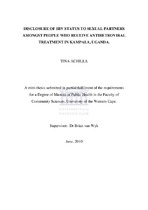Disclosure of HIV status to sexual partners amongst people who receive antiretroviral treatment in Kampala, Uganda
Abstract
The increased number of new infections in Uganda necessitates HIV prevention programmes that address risky behaviours especially among heterosexual populations. The AIDS Support Organisation (TASO) is the largest indigenous HIV/AIDS agency serving Uganda and the Great Lakes Region. TASO endeavours to empower sexually active clients to disclose their sero-status to their sexual partners and promotes partner testing for HIV. In spite of these efforts, only 12% of 2,071 sexually active clients in Mulago centre had disclosed by the end of 2006. This study aimed to explore the factors that influence clients’ decisions to disclose their HIV status to their partners in TASO Mulago, Kampala, Uganda. The study used a qualitative approach. Fourteen (14) in-depth interviews were conducted with English and Luganda speaking adult male and female clients on antiretroviral treatment (ART), in TASO Mulago. A focus group discussion (FGD) was conducted with 8 purposively selected ART clients who were considered to be ‘expert’ clients in
TASO Mulago. These participants were expert clients/ peer educators, who were open about their HIV status and have been involved in HIV/AIDS education and advocacy. The individual interviews and the focus group discussion were transcribed verbatim, and subjected to thematic and content analysis. Male and female participants who were married (primary relationship) disclosed their sero-status to their sexual partners, while few of those cohabiting or in steady relationship (only one) disclosed to their partners. Enabling factors to disclose to current sexual partners included: desire for partner to get treatment, need for the partner’s support, having prior knowledge of partner’s HIV status, out of anger, and having anxiety about
the future. Some of the barriers to disclosure included: fear of blame and disappointing the partner, fear of abandonment, fear of stigma and discrimination Participants suggested that couple counselling and testing, economic independence, peer support and involvement of the TASO staff in disclosure should be considered to facilitate or promote disclosure to sexual partners.While strategies like HBHCT and couple counselling have enhanced disclosure among sexual partners on ART living together in stable married relationships (primary), the partners in secondary relationships (cohabiting and steady) especially women, continue to face challenges in disclosure yet their sexual partners are at risk of HIV infection. The study has re-affirmed the fact that while some people living with HIV/AIDS wish to disclose their HIV status to their partners, there are compound factors that make it
difficult to disclose. This calls for effective strategies by government, TASO and other agencies to ensure that sexual partners especially in cohabiting and steady relationships are disclosed to in order to reduce their vulnerability to HIV infection.

